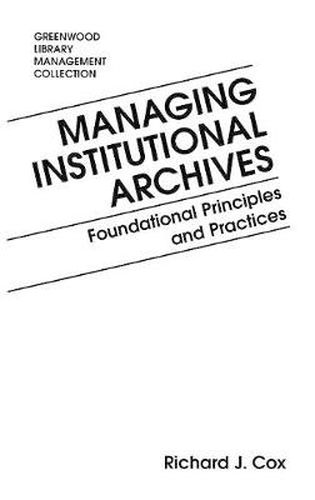Readings Newsletter
Become a Readings Member to make your shopping experience even easier.
Sign in or sign up for free!
You’re not far away from qualifying for FREE standard shipping within Australia
You’ve qualified for FREE standard shipping within Australia
The cart is loading…






This volume is intended to aid both those organizations considering the establishment of an institutional archive and those practicing archivists needing materials to assist them in evaluating their programmes and planning for their development. The author’s theme is that archival programmes found in corporate, educational, cultural, and religious institutions are necessary both to the organizations themselves and their efficient functioning and to society’s concern for preserving its documentary heritage. Managing Institutional Archives covers all aspects of managing an archival programme. There are chapters on appraisal and acquisition; preservation and security; arrangement, description, and reference; internal and external support, fund-raising and grantsmanship; and co-operation. The impact of new information technology on organizations and the implications for their archives are discussed. A detailed examination of three case studies of archives is provided. The final chapter is a description of sources for additional assistance in managing institutional archives.
Managing Institutional Archives should be useful to archival specialists, administrators, educators, and others needing guidance about the elements of managing archives. Its contents is based on a wide-reading of archival theory and practice and nearly two decades of archival experience by the author.
$9.00 standard shipping within Australia
FREE standard shipping within Australia for orders over $100.00
Express & International shipping calculated at checkout
This volume is intended to aid both those organizations considering the establishment of an institutional archive and those practicing archivists needing materials to assist them in evaluating their programmes and planning for their development. The author’s theme is that archival programmes found in corporate, educational, cultural, and religious institutions are necessary both to the organizations themselves and their efficient functioning and to society’s concern for preserving its documentary heritage. Managing Institutional Archives covers all aspects of managing an archival programme. There are chapters on appraisal and acquisition; preservation and security; arrangement, description, and reference; internal and external support, fund-raising and grantsmanship; and co-operation. The impact of new information technology on organizations and the implications for their archives are discussed. A detailed examination of three case studies of archives is provided. The final chapter is a description of sources for additional assistance in managing institutional archives.
Managing Institutional Archives should be useful to archival specialists, administrators, educators, and others needing guidance about the elements of managing archives. Its contents is based on a wide-reading of archival theory and practice and nearly two decades of archival experience by the author.